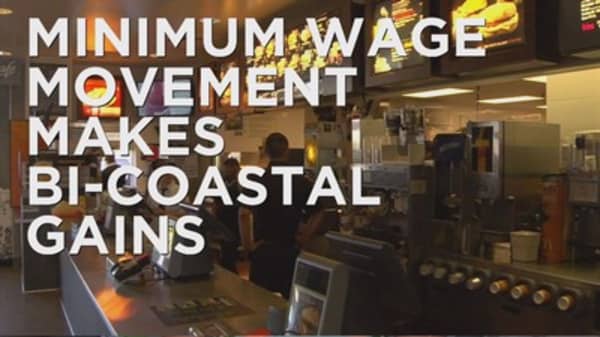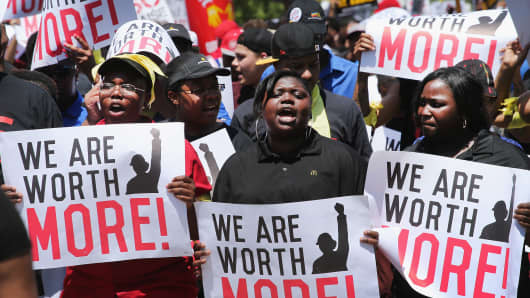On that November morning, I was terrified. I didn't know if I would be disciplined, or maybe even fired, for going on strike. At $7.25, though, I felt I didn't have a choice but to take a chance. As the crowd massed on the strike line, my fear started to melt away. We chanted, "We can't survive on $7.25, We can't survive on $7.25, We can't survive on $7.25." I remember for the first time feeling so powerful, like change was possible, as we rallied with other workers who were in the same situation as me, from restaurants like McDonald's, Burger King and Wendy's.
Read More Learning from Starbucks on job creation
We all took a chance that day because our backs were against the wall. We demanded $15 and union rights because that's what we needed to support our families without having to rely on food stamps and rent assistance. We knew it would be a tough road, but we hoped that if we stuck together, we would win.
And we did. On Wednesday, when New York's Wage Board recommended raising pay to $15 an hour for fast-food workers in the entire state, I was instantly brought back to that day in November. I remember everyone telling us that $15 was impossible, and we should turn around and go back to our jobs. But in just three years, in the same city where the movement began, we have proven that we can be our own champions and change our own paths.
Read MoreNew York moves to raise state minimum wage to $15 for fast-food workers
In a little less than three years, I've been on strike 10 times. I've watched as the movement spread to Chicago, St. Louis, and then all around the country and the world. I traveled to Denmark, where I visited with fast-food workers who are paid more than $21 an hour, and it gave me hope that winning higher pay was actually possible.
Today, workers from Florida to Wisconsin to Arizona are declaring victory because they know that if $15 can happen in New York, it can happen in their states, too.
What does $15 mean for me? It means that I won't have to turn to food stamps to feed my four growing children. It means I don't have to live in fear of the gas or water being turned off because I can't pay my bills. It means that I can afford simple things, like a bus pass, without worrying, and that affording big things, like treatment for cancer, aren't entirely out of reach. For me, personally, $15 means everything.
Read More Los Angeles raises minimum wage to $15. Which city is next?
But more importantly, when Gov. Andrew Cuomo approves the wage board's recommendation and we win $15 across New York, it will prove that when you stand up and speak out, you can achieve life-changing victories. All across the country, underpaid workers are doing just that — not just in New York and not just in fast food, but in home care, child care and other industries too. Fifteen dollars an hour in New York is just the beginning, and if you don't believe me, you're just like everyone else who told us that November day nearly three years ago that we had no shot to win.
Commentary by Alvin Major, a KFC employee in Brooklyn and a leader of the $15 minimum-wage movement.








